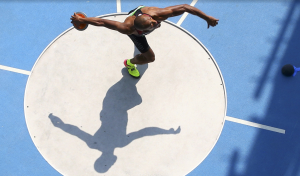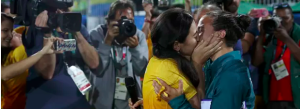
The most commented sport modalities of the Rio Olympics were the gender relations obstacle course competition, racism target shooting and out-of-closet leaping
by Fernando Seffner[1]
The Rio Olympics were many things, all at once. Records were broken, sports fans became excited, sweat and tears flowed and people celebrated. But these were also games preceded by arbitrary evictions of local communities in order to make way for stadiums and arenas and by financial scandals, unmet environmental goals and corruption.[2] They also witnessed the imperialist arrogance of the world’s largest power, portrayed as an innocent teenagers’ prank on the Brazilian police. There were moments of both beauty and political embarrassment during the opening ceremony[3], which was both praised and criticized for its lack of consistency, a disjunction that often occurs when a country talks about itself to the world. There was booing, fan excesses and name-calling, as well as surprising applauses for some countries. The Games also introduced the world to an unprecedented delegation of ten refugee athletes. All this and much more occurred during the 2016 Summer Olympics.
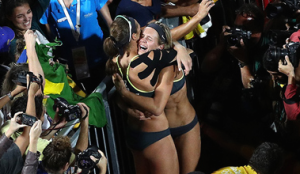 The Games were also a privileged stage for the exhibition of young male and female bodies: fit, muscled, with zero fat, firm breasts, colorful spandex outfits, and shiny oiled skin. Bodies that often touched each other in the struggles, in caresses after victory, and in friendly hugs after defeat. Bodies that were intensively filmed and photographed and which were often portrayed in highly intimate close-ups. It was hard to restrain one’s libido and erotic desires while watching these bodies, particularly if one was a member of a society that has transformed sexuality into flashy markers of national identity and a tourist attraction. But even the athletes themselves were overtaken by the ethos of bodily exhibition, performing public scenes of quasi-nudity and anxiously doing their best to grab the cameras’ attention. [4]
The Games were also a privileged stage for the exhibition of young male and female bodies: fit, muscled, with zero fat, firm breasts, colorful spandex outfits, and shiny oiled skin. Bodies that often touched each other in the struggles, in caresses after victory, and in friendly hugs after defeat. Bodies that were intensively filmed and photographed and which were often portrayed in highly intimate close-ups. It was hard to restrain one’s libido and erotic desires while watching these bodies, particularly if one was a member of a society that has transformed sexuality into flashy markers of national identity and a tourist attraction. But even the athletes themselves were overtaken by the ethos of bodily exhibition, performing public scenes of quasi-nudity and anxiously doing their best to grab the cameras’ attention. [4]
Furthermore, these male and female athletes with their powerful and desirable bodies were living together in a quasi-mythical place called the “Olympic Village”, a fantasy world referencing a Mount Olympus inhabited by gods and goddesses in perennial sexual excess. [5] They slept close to each other, showered collectively, ate together, walked in groups between the trees, and relaxed under the sun at the public swimming pools in a joyful state of sociability. It is impossible to not speculate about their sexual lives, love affairs and trysts. Although figures vary, some 450 thousand male and 100 thousand female condoms were distributed to the athletes[6] and stocks were apparently replenished seven times a day. This gives us an average of 42 condoms per athlete over sixteen days of competition, which means more than two condoms per athlete per day. Given that not all of the competitors were staying in the Olympic Village, the average may in fact be a bit higher. The international press constantly reported that sex partner seeking cell phone apps had reached peak intensity of use around the Olympic Village.[7] This was apparently the scene of a sexual marathon, perhaps even with the distribution of gold medals. No podiums were mounted, however.
The Games have a long history of being an exclusively masculine event.[8] But for many decades now the presence of women has been expanding, reaching 45 percent of those who competed in Rio de Janeiro. [9] Women have also taken the lead in achieving records in ways that make us ask if the classic “male” and “female” division of certain sport modalities still makes sense. ”Gender roles” were still very much at play during the Games, however. While women have rapidly enlarged their presence in many sports, men still resist entering the female domain of synchronized swimming. Everything is still OK for men in those modalities that remain highly engendered and Olympic records are still higher for men. But women have made strides even in these domains and the competitive statistics are now getting closer, blurring the historical gender division that situated women in the lower ranks of athletes. The same thing is happening to the traditional gap between the Olympic and Paralympic games.[10] Unexpected records have been achieved by parathletes, for which more elaborate explanations are now being sought.
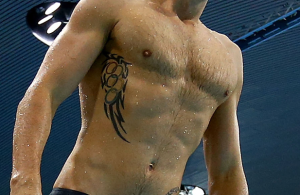 Women are becoming very well prepared and very professional in the field of sports. Every day they break records in all modalities. At the end of day, however, they are still mostly appraised for their beauty.[11] The majority of sports’ commentators are male and, consequently, a constant stream of macho, sexist and misogynistic discourse is still an inevitable part of sports commentary. Even today, Olympic games are seen and commented as if they were “men’s business”, a field in which women are either tolerated or else seen as ornamental. Quite often, commentators who were supposedly commenting upon a female victory would say: “the winner really deserves a gold medal in beauty”. They would also enthusiastically scream: “It’s gold, gold in beauty! She is a winner”! Meanwhile, other commentators would praise male success in sports by commenting that the athlete was a “true Alpha male”.
Women are becoming very well prepared and very professional in the field of sports. Every day they break records in all modalities. At the end of day, however, they are still mostly appraised for their beauty.[11] The majority of sports’ commentators are male and, consequently, a constant stream of macho, sexist and misogynistic discourse is still an inevitable part of sports commentary. Even today, Olympic games are seen and commented as if they were “men’s business”, a field in which women are either tolerated or else seen as ornamental. Quite often, commentators who were supposedly commenting upon a female victory would say: “the winner really deserves a gold medal in beauty”. They would also enthusiastically scream: “It’s gold, gold in beauty! She is a winner”! Meanwhile, other commentators would praise male success in sports by commenting that the athlete was a “true Alpha male”.
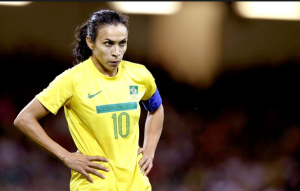 Since both feminist and non-feminist athletes exists, a debate also exists. Some women in sports simply recognize their own individual merits, while others — following the discourses of social movements — view women’s collective conquest of wider Olympic spaces as an agenda to be actively pursued and celebrated. Male sports commentators, however, quite visibly tend to emphasize individual female efforts and do not give credit to the feminism that inspires many athletes. If some women have climbed the podium, this is generally and solely attributed to their individual capacities. Often, male commentators’ fears that these victories can be read as some sort of feminist gain are quite palpable. The public treatment of female athletes can also be much more severe that that given to men. For example, the Brazilian female soccer team made national headlines while they were winning, but when they started losing they were lambasted by male commentators. The last female soccer games were not even transmitted on open TV. It is also to be noted that while female soccer coaches are a worldwide phenomenon, this is not the case in Brazil.
Since both feminist and non-feminist athletes exists, a debate also exists. Some women in sports simply recognize their own individual merits, while others — following the discourses of social movements — view women’s collective conquest of wider Olympic spaces as an agenda to be actively pursued and celebrated. Male sports commentators, however, quite visibly tend to emphasize individual female efforts and do not give credit to the feminism that inspires many athletes. If some women have climbed the podium, this is generally and solely attributed to their individual capacities. Often, male commentators’ fears that these victories can be read as some sort of feminist gain are quite palpable. The public treatment of female athletes can also be much more severe that that given to men. For example, the Brazilian female soccer team made national headlines while they were winning, but when they started losing they were lambasted by male commentators. The last female soccer games were not even transmitted on open TV. It is also to be noted that while female soccer coaches are a worldwide phenomenon, this is not the case in Brazil.
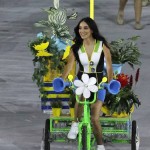 Last but not least, the presence of the Brazilian transwomen Lea T. in the Opening Ceremony drastically revealed Brazilian sport commentators’ lack of gender and sexuality savviness. These men either remained silent when confronted with images of transwomen or exoticized their participation. On the other hand, however, during the Games, we have saw and heard many appraisal of athletes, judges and field assistants lauding them for precisely those attributes that are traditionally understood as “naturally” feminine: attention to detail, peripheral attention, concentration, and the ability to quickly resolve emergencies. In this sense the 2016 Games have been an obstacle course in terms of gender relations.
Last but not least, the presence of the Brazilian transwomen Lea T. in the Opening Ceremony drastically revealed Brazilian sport commentators’ lack of gender and sexuality savviness. These men either remained silent when confronted with images of transwomen or exoticized their participation. On the other hand, however, during the Games, we have saw and heard many appraisal of athletes, judges and field assistants lauding them for precisely those attributes that are traditionally understood as “naturally” feminine: attention to detail, peripheral attention, concentration, and the ability to quickly resolve emergencies. In this sense the 2016 Games have been an obstacle course in terms of gender relations.
The Olympics are not just a “male space” in terms of their historical exclusivity, of course. Traditionally, the Games have also been a space restricted to Western white men. Consequently, the growing presence of black and Asian athletes triggered a number of comments by the talking heads of the global mainstream media networks, who are predominantly Western and white. These comments barely hid North American and European racism and ethnocentrism. Brazilian anchors and reporters were also strongly and widely criticized for racist commentary and these reactions should be celebrated as part of our ongoing efforts to construct a non-racist society — a very difficult task in country that views itself as essentially cordial and non-racist. As usual after a racist comment is made in Brazil, those responsible tried to explain that they had been joking. But this time the strategy did not work.[12] Brazilian fans were very happy with the male gymnastic bronze medal and they didn’t forget the racist comment made in 2015 by the winner.[13] Racist comments regarding Brazil’s female goalie also rapidly became headlines and those responsible for making them had to apologize.[14]. Robson Conceição, who won a gold medal in boxing, used the podium to criticize Brazil’s recent reduction of the age of criminal responsibility, which he views as death sentence for young black men, citing himself as a person who could have been victimized by this new law[15]. These well-aimed at the target of racism come as quite a relief in the face of Brazil’s long-standing tradition of impunity with regards to racist speech by or against public figures. Those who no longer accept racist prejudice disguised as jokes definitely deserve a gold medal.
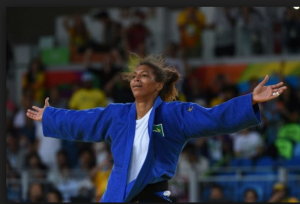 Finally, the Rio Games have been a remarkable moment for LGB visibility. As has been widely acknowledged, these were the “gayest” Olympics of all time. The numbers vary depending on the source, but the last count speaks of 55 openly gay, lesbian and bisexual athletes competed.[16]. There were 11 openly gay participants, including Ian Matos, the Brazilian ornamental jumper. There was also the outstanding Judo gold medal of Rafaela Silva, who became recognized as an icon of gender and racial equality and lesbian rights.
Finally, the Rio Games have been a remarkable moment for LGB visibility. As has been widely acknowledged, these were the “gayest” Olympics of all time. The numbers vary depending on the source, but the last count speaks of 55 openly gay, lesbian and bisexual athletes competed.[16]. There were 11 openly gay participants, including Ian Matos, the Brazilian ornamental jumper. There was also the outstanding Judo gold medal of Rafaela Silva, who became recognized as an icon of gender and racial equality and lesbian rights.
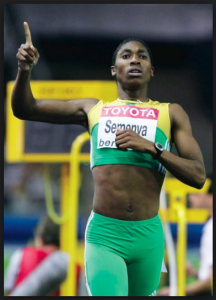 The question of markers of sexual difference involves numerous polemics regarding the participation of female trans and intersex athletes in the Games. This was also a hot topic in 2016, even though it did not initially capture the attention of the Brazilian media. In January 2016, the rules of the International Athletics Federation with regards to the testosterone levels of female competitors were suspended as a result of an anti-discrimination lawsuit presented by Indian runner Dutte Chand after she refused to use hormone suppressors in order to participate in the Glascow Games. [17] The topic could no longer be avoided by the Brazilian media after Caster Semenya [18] victory in the 800 meter race. In 2009,Semenya was banned from running in the Berlin competition, becoming the icon of the intense and complex debate over racism, colonialism and discrimination against people whose gender expression differs from the dominant norms. [19]
The question of markers of sexual difference involves numerous polemics regarding the participation of female trans and intersex athletes in the Games. This was also a hot topic in 2016, even though it did not initially capture the attention of the Brazilian media. In January 2016, the rules of the International Athletics Federation with regards to the testosterone levels of female competitors were suspended as a result of an anti-discrimination lawsuit presented by Indian runner Dutte Chand after she refused to use hormone suppressors in order to participate in the Glascow Games. [17] The topic could no longer be avoided by the Brazilian media after Caster Semenya [18] victory in the 800 meter race. In 2009,Semenya was banned from running in the Berlin competition, becoming the icon of the intense and complex debate over racism, colonialism and discrimination against people whose gender expression differs from the dominant norms. [19]
The greater visibility of gays and lesbians made headlines, triggering press strategies to force more people out of the closet. This, in turn, revealed how deep and strong in Western culture is curiosity with regards to the sexual lives of other people. Rio Games also showed, however, that we have definitely condemning homosexuality to the repudiation of homophobia. A British journalist was sharply criticized for having broken ethical standards by using Tinder to “out”, gay athletes who did not want to publicly announce their sexuality.[20] The journalist’s act was widely understood to have caused these athletes moral injury and, in some case, to have put their lives and liberties at risk. Furthermore, many athletes have openly thanked their same sex partners for their support, either when receiving medals or when talking about their defeats. The 2016 Games’ atmosphere was oxygenated by these glimpses of homosexual intimacy. This ”leaping out of the closet” form that has overtaken Olympic sports caught society by surprise. At a time in which we have seen so much backsliding in the field of sexual rights, this was the sports modality which should’ve have properly seen the greatest number of gold medals distributed at the Rio Games.
Either because of the massive and exceptionally successful presence of women, or as an effect of the images and debates triggered by the greater visibility of non–normative sexualities, the 2016 Rio Olympic Games became a stage for progressive tendencies to resist moralizing and dogmatic religious forces, which in recent years have systematically promoted sexual moral panics and propelled public policy and legal regression in Brazil and throughout the world.
Notes
_______________
[1] Professor at the Programa de Pós-Graduação em Educação da Universidade Federal do Rio Grande do Sul (PPGEDU/UFRGS), where he develops a line of research on Education, Sexuality and Gender Relations. Email fernandoseffner@gmail.com
[2] http://www.fundodireitoshumanos.org.br/serie-de-videos-da-justica-global-mostra-violacoes-na-cidade-dos-jogos-olimpicos/ (Portuguese)
[3] Roughly 20 heads of state were present at the opening of the Olympic Games Rio 2016, while more than 80 were present in London four years ago.
[4] http://www.towleroad.com/2016/08/danell-leyva-strips/ (English)
[5] http://visao.sapo.pt/atualidade/rio-2016/2016-08-17-Farra-nos-Jogos-do-Rio–Uso-do-Tinder-dispara-na-Aldeia-Olimpica (Portuguese)
[6] http://esportes.estadao.com.br/noticias/jogos-olimpicos,sexo-jogos-e-preservativos-estoque-de-camisinhas-dos-jogos-esta-encalhado,10000068868 (Portuguese) http://www.usatoday.com/story/sports/olympics/rio-2016/2016/08/03/rio-olympics-450000-condoms-athletes-village/88039680/ (English)
[7] http://brasil.elpais.com/brasil/2016/08/10/deportes/1470836827_764528.html (Portuguese) and https://www.washingtonpost.com/world/olympics/hookup-games-tinder-usage-up-among-athletes-at-rio-olympics/2016/08/09/e13ac2cc-5e8b-11e6-84c1-6d27287896b5_story.html (English)
[8] http://www.bbc.com/portuguese/brasil-36911394 (Português) e http://www.bbc.com/news/world-us-canada-37120618 (English)
[9] http://www.refinery29.com/2016/07/116389/female-athletes-olympics-2016#slide
[10] https://www.rio2016.com/paralimpiadas (Português) e https://www.rio2016.com/en/paralympics (english)
[11] https://rioolimpiada.wordpress.com/ (Portuguese) e http://www.totalsportek.com/list/hottest-olympics-athletes/ (English)
[12] https://www.nexojornal.com.br/expresso/2016/08/15/Por-que-racismo-em-forma-de-piada-n%C3%A3o-%C3%A9-s%C3%B3-uma-brincadeira (Portuguese)
[13] http://www.revistaforum.com.br/2016/08/15/vitima-de-racismo-manda-recado-para-arthur-nory-que-seja-medalhista-fora-do-tablado/ (Portuguese)
[14] https://esportes.yahoo.com/noticias/conselheiro-federal-faz-post-racista-contra-a-goleira-da-sele%C3%A7%C3%A3o-feminina-210227009.html (Portuguese)
[15] http://www.brasilpost.com.br/2016/08/17/robson-boxe violencia_n_11575260.html?ncid=tweetlnkbrhpmg00000002 (Portuguese)
[16] http://www.outsports.com/2016/7/11/12133594/rio-olympics-teams-2016-gay-lgbt-athletes-record?ncid=fcbklnkushpmg00000050 (English)
[17] http://thinkprogress.org/…/3804393/olympics-lgbt-athletes/ e https://thinkprogress.org/this-years-olympics-will-have-the-most-openly-lgbt-athletes-ever-5bab73312f5f#.cnjqlz64n (English)
[18] Em português http://www.bbc.com/portuguese/geral-37133784?SThisFB (Portuguese) and http://www.nytimes.com/2009/09/03/opinion/03iht-edgevisser.html?_r=0 (English)
[19] http://globoesporte.globo.com/olimpiadas/atletismo/noticia/2016/08/semenya-deixa-preconceito-e-rivais-para-tras-e-conquista-ouro-nos-800m.html (Portuguses)
[20] http://observatoriodatelevisao.bol.uol.com.br/famosos/2016/08/jornalista-tira-atletas-do-armario-e-nadador-responde-com-bumbum-de-fora (Portuguese) e https://www.thesun.co.uk/sport/rio-olympics-2016/1595034/rio-olympics-2016-straight-olympic-journalist-causes-anger-after-outing-gay-athletes-on-hookup-apps/ (English)

